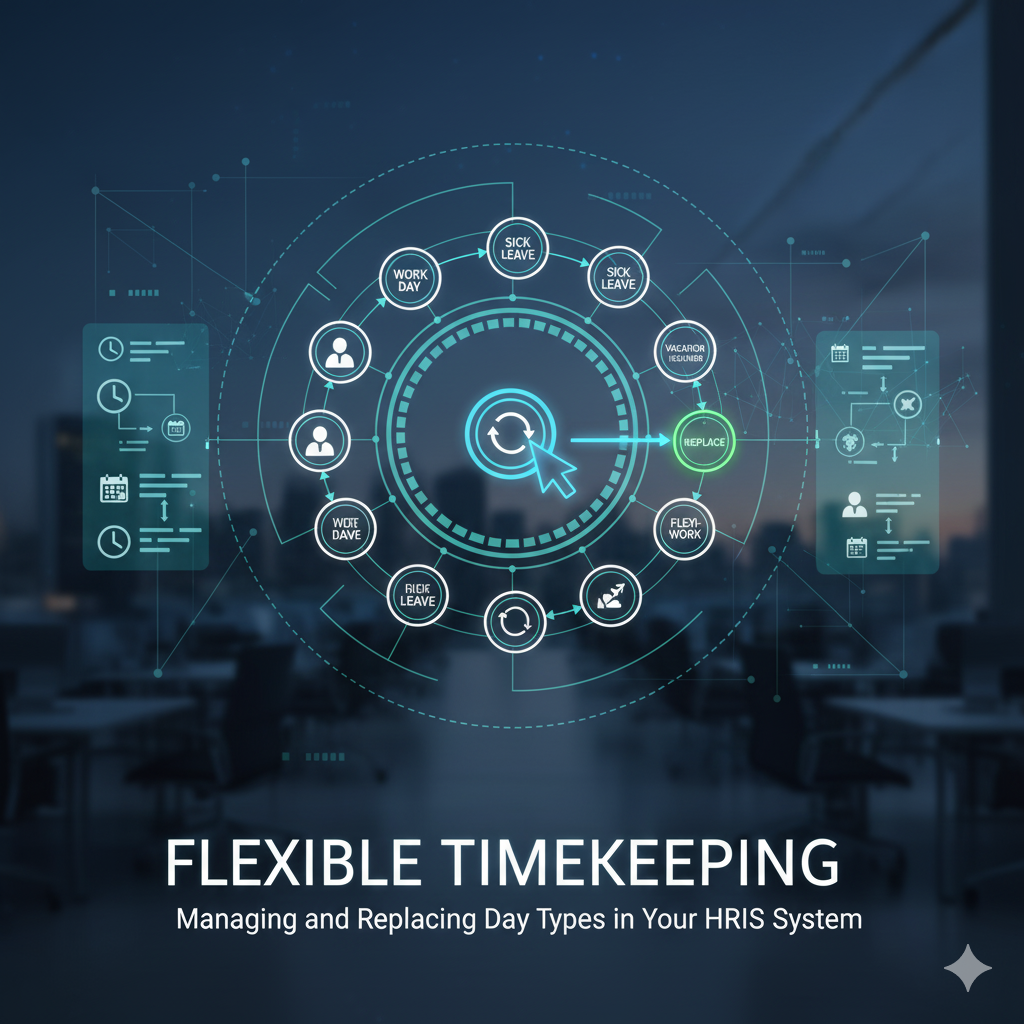Address
Kaypian, San Jose Del Monte City, Bulacan Philippines
Work Hours
Monday to Friday: 8AM - 6PM
Weekend: 10AM - 5PM
Address
Kaypian, San Jose Del Monte City, Bulacan Philippines
Work Hours
Monday to Friday: 8AM - 6PM
Weekend: 10AM - 5PM


Integrated HR. Accurate Payroll.


Integrated HR. Accurate Payroll.

In every organization, timekeeping accuracy plays a vital role in ensuring fair pay, compliance, and productivity. Yet, HR teams often face challenges when managing special workdays — such as holidays, rest days, and make-up schedules.
What happens when a declared holiday becomes a regular workday, or when a rest day shifts due to operations? Without an automated system, HR personnel have to manually adjust day types — a process prone to errors and inconsistencies.
This is where modern HRIS (Human Resource Information System) solutions come in. They provide flexible timekeeping tools that allow administrators to manage and replace day types easily, ensuring that attendance and payroll always stay accurate and up-to-date.
Day types refer to how a particular date is categorized in a timekeeping system — for example:
Each day type directly affects how hours worked, overtime, and pay rates are calculated.
When schedules change — such as converting a holiday to a regular workday or rest day to a working day — the HRIS system must be able to handle these adjustments quickly and accurately.
Traditional timekeeping methods require HR staff to manually update day types in spreadsheets or attendance logs. This approach often leads to:
❌ Human errors in tagging or recalculating work hours
❌ Inconsistent payroll results due to outdated day type data
❌ Delayed payroll processing when changes need revalidation
❌ Difficulty tracking audit logs of who made adjustments
In organizations with multiple branches or frequent schedule changes, manual updates become inefficient and error-prone.
A modern HRIS Timekeeping Module automates and centralizes this process. Here’s how it works:
✅ 1. Smart Day Type Detection
The system automatically identifies the correct day type based on calendar settings, holidays, and company rules.
✅ 2. Easy Replacement Tools
Administrators can easily replace a day type (e.g., “Holiday” to “Regular Day”) with just a few clicks. The HRIS automatically updates the attendance records and recalculates related payroll data.
✅ 3. Centralized Control
Changes apply across all affected employees or branches instantly — no need for manual edits in multiple files.
✅ 4. Audit Trail and Approval Flow
Every day type replacement is logged, showing who made the change, when, and why, ensuring transparency and accountability.
✅ 5. Seamless Payroll Integration
Once updated, the new day type data automatically syncs with the payroll module, ensuring that salary computations remain correct and compliant.
Imagine a company with several branches where a local holiday was suddenly canceled or moved.
In a traditional system, each HR officer would need to manually edit DTRs (Daily Time Records) for affected employees — a time-consuming process.
With an HRIS, an admin can simply select the affected date, choose “Replace Day Type,” and update it from Holiday → Regular Day.
The system then:
What used to take hours can now be done in seconds, with zero risk of miscalculation.
💡 1. Accuracy in Payroll Processing
No more overpayment or underpayment due to misclassified day types.
💡 2. Increased HR Efficiency
HR teams save time on manual corrections and focus on higher-value tasks.
💡 3. Compliance Assurance
Automated calculations ensure correct pay rules are applied for holidays, rest days, and overtime.
💡 4. Real-Time Updates Across Branches
Multi-branch companies benefit from centralized control, keeping all branches aligned with the same timekeeping data.
💡 5. Employee Trust and Transparency
Accurate and timely salary computations improve employee confidence in the HR system.
In dynamic workplaces where shift changes, flexible schedules, and operational adjustments are common, a static timekeeping setup simply won’t work.
An HRIS system that supports dynamic day type replacement helps organizations stay agile — adapting to sudden changes without disrupting payroll or compliance.
Flexible timekeeping is no longer a luxury — it’s a necessity for modern HR operations.
By adopting an HRIS system that allows managing and replacing day types automatically, businesses can ensure:
With the right timekeeping tools, managing holidays, regular days, and special schedules becomes simple, fast, and reliable — keeping both HR teams and employees happy.